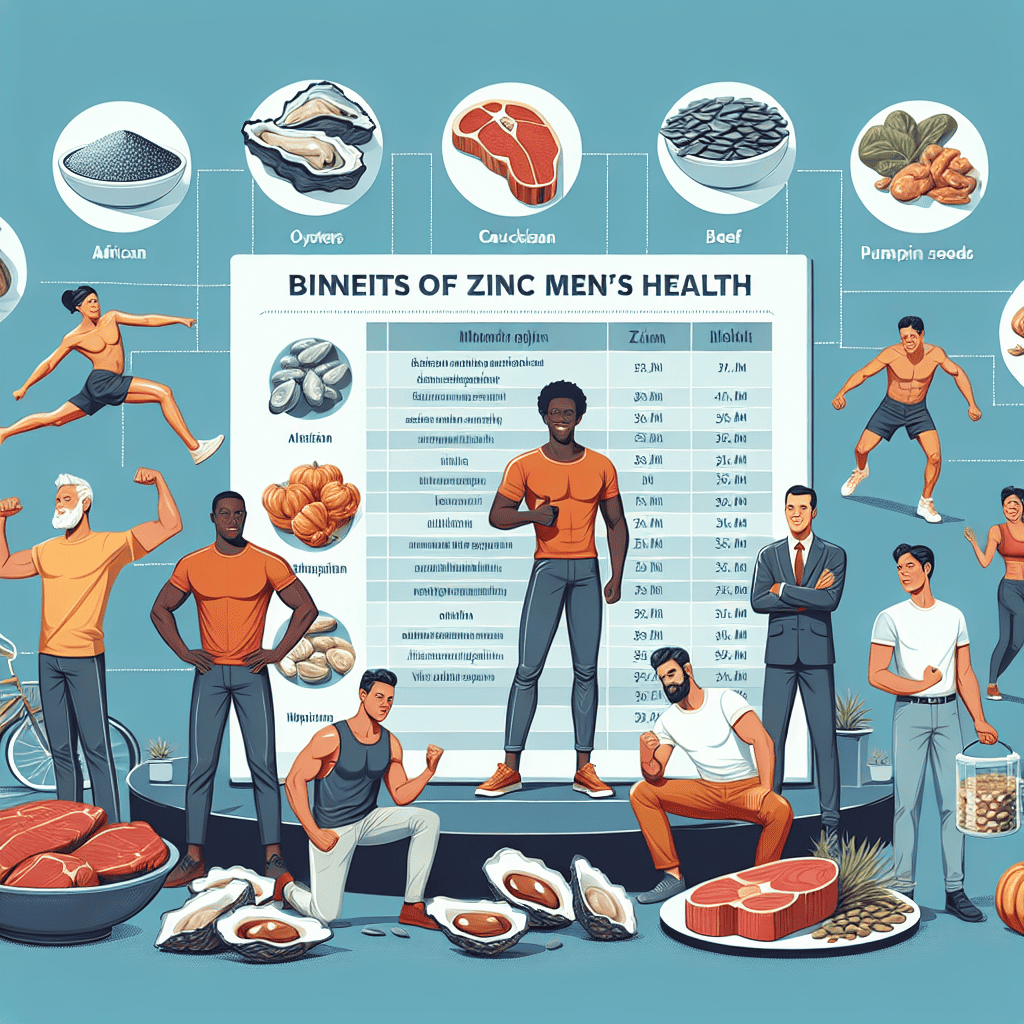Introduction: Zinc is a crucial mineral that plays a significant role in men’s sexual health. This blog post delves into the impact of zinc deficiency on various aspects of men’s sexual wellness, including erectile dysfunction, prostate health, testosterone levels, and sperm count.
Table of Contents
The Link Between Zinc Deficiency and Erectile Dysfunction
Understanding how zinc deficiency can contribute to erectile dysfunction.
- Zinc’s Importance for Sexual Health:
Zinc is a vital mineral that plays a crucial role in various physiological processes within the body. One of the key functions of zinc is its involvement in cell division, which is essential for growth, development, and overall health. Zinc is also necessary for the production of genetic material, such as DNA, RNA, and proteins, which are critical for the proper functioning of cells. Furthermore, zinc is a key element in the synthesis of testosterone, a hormone that is important for the development of male reproductive tissues and the maintenance of male characteristics. Therefore, ensuring an adequate intake of zinc is essential for overall health and well-being.
When the body experiences a deficiency in zinc, it can have detrimental effects on various bodily functions, including sexual health. One area where zinc deficiency can have a significant impact is in the realm of sexual function, particularly in men. Studies have indicated a clear correlation between zinc deficiency and an increased risk of experiencing erectile dysfunction. Erectile dysfunction is a condition characterized by the inability to achieve or maintain an erection sufficient for sexual intercourse. The connection between zinc levels and erectile function lies in zinc’s role in testosterone production and its overall influence on sexual health. Therefore, maintaining optimal levels of zinc in the body is crucial for supporting healthy sexual function.
In light of the relationship between zinc deficiency and erectile dysfunction, it is important for individuals to ensure they are meeting their daily recommended intake of zinc. Good dietary sources of zinc include meat, shellfish, legumes, nuts, seeds, and dairy products. For individuals who may struggle to get enough zinc through their diet alone, zinc supplements are also available. However, it is essential to consult with a healthcare provider before starting any new supplement regimen to determine the appropriate dosage and ensure it is safe and suitable for individual needs. By maintaining adequate levels of zinc in the body, individuals can support not only their sexual health but also their overall health and well-being.
- Zinc Supplements as a Treatment:
Zinc is an essential mineral that plays a crucial role in various bodily functions, including supporting the immune system, wound healing, and DNA synthesis. In the context of erectile dysfunction, zinc is particularly beneficial due to its ability to boost testosterone levels and improve blood flow to the genital area. Testosterone is a key hormone in regulating sexual function in both men and women. Low levels of testosterone have been linked to erectile dysfunction, making zinc supplementation a potential solution.
In addition to its hormone-regulating properties, zinc also acts as a vasodilator, meaning it helps to relax blood vessels and improve circulation. This effect is especially important for individuals with erectile dysfunction, as adequate blood flow to the penis is essential for achieving and maintaining an erection. By taking zinc supplements, individuals may experience improved blood flow to the genital area, leading to enhanced sexual function.
Furthermore, zinc can be taken in various forms, such as zinc gluconate, zinc sulfate, or zinc citrate. These supplements are generally well-tolerated, but it is essential to follow recommended dosages to avoid potential side effects. While zinc alone may not be a cure-all for erectile dysfunction, incorporating it into a comprehensive treatment plan that includes lifestyle changes, such as exercise and a healthy diet, as well as other medical interventions, can provide significant benefits. Consulting with a healthcare provider is crucial to determine the most effective approach for addressing erectile dysfunction with the help of zinc supplementation.
Benefits of Zinc for Prostate Health
Exploring how zinc supports prostate health and may reduce the risk of prostate cancer.
- Protective Role Against Prostate Cancer:
Zinc plays a crucial role in various physiological processes within the body, including immune function, DNA synthesis, and cell division. In the context of prostate cancer, zinc has been identified as a potential influential factor in inhibiting tumor growth. Research suggests that this mineral can interfere with the signaling pathways that support the growth and proliferation of prostate cancer cells. By creating a less favorable environment for these cells to thrive, zinc may help reduce the risk of prostate cancer development. This highlights the importance of maintaining optimal zinc levels for overall health and potential cancer prevention.
The relationship between zinc and prostate cancer is not only limited to its ability to inhibit tumor growth but also extends to its impact on prostate health in general. Zinc deficiency has been associated with an increased risk of developing prostate cancer, indicating the significance of this mineral in maintaining the health of the prostate gland. Additionally, studies have demonstrated that zinc levels in prostate tissue are typically higher than in other soft tissues, underscoring the specific importance of zinc in prostate function. Ensuring adequate zinc intake through diet or supplementation may therefore be a valuable strategy in supporting prostate health and potentially reducing the likelihood of prostate cancer.
While zinc shows promise in its potential role in reducing the risk of prostate cancer development, it is essential to approach supplementation with caution. Excessive zinc intake can have adverse effects and disrupt the body’s mineral balance, leading to toxicity. Therefore, it is recommended to consult with a healthcare provider before initiating zinc supplementation, especially for individuals with preexisting medical conditions or those taking medications that may interact with zinc. A balanced and varied diet that includes zinc-rich foods such as oysters, red meat, poultry, beans, nuts, and whole grains can often provide adequate levels of this essential mineral for overall health and potentially prostate cancer prevention.
- Promoting Brain Health:
Zinc is an essential mineral that is crucial for various bodily functions, including supporting normal growth and development, DNA synthesis, immune function, and neurological performance. Within the brain, zinc plays a critical role in regulating communication between neurons, which is vital for processes such as learning and memory. Research has indicated that maintaining adequate levels of zinc in the brain is linked to cognitive function and overall mental well-being. Therefore, a deficiency in zinc could potentially lead to cognitive impairments or neurological disorders.
When it comes to prostate cancer, studies have found a correlation between zinc intake and the risk of developing the disease. A diet rich in zinc has been associated with a reduced likelihood of prostate cancer mortality. Furthermore, supplementation with zinc has shown promising results in lowering the incidence of prostate cancer. This could be attributed to zinc’s role in DNA repair, cell growth regulation, and immune system support, all of which are important factors in cancer development and progression. However, it is essential to note that while zinc may have a protective effect against prostate cancer, individual responses to supplementation can vary, and further research is needed to fully understand the mechanisms involved.
Incorporating zinc-rich foods into the diet, such as seafood, lean meats, nuts, seeds, and legumes, can be a practical way to ensure an adequate intake of this essential mineral. For individuals who may have difficulty meeting their zinc requirements through diet alone, supplementation could be an option to consider under the guidance of a healthcare provider. It’s also important to maintain a balanced and varied diet to support overall health and well-being. While zinc certainly shows promise in promoting brain health and potentially reducing the risk of prostate cancer, more studies are needed to explore the specific mechanisms and optimal dosages for achieving these benefits.
Zinc’s Influence on Testosterone Levels and Sperm Count
Examining how zinc impacts testosterone production and sperm count in men.
- Boosting Testosterone Levels:
Zinc is an essential mineral that plays a vital role in the production of testosterone in males. Testosterone is a key hormone responsible for various functions in the male body, including the development of reproductive tissues, hair growth, bone density, and muscle mass. When zinc levels are low, it can negatively impact testosterone production, leading to potential issues in these areas. Ensuring an adequate intake of zinc is crucial for maintaining optimal testosterone levels and overall health in males.
One way to combat low zinc levels and subsequently boost testosterone production is through zinc supplementation. Studies have shown that supplementing with zinc can help increase testosterone levels in both adult males and adolescents. By providing the body with an additional source of zinc, individuals can support the necessary processes involved in testosterone synthesis. This supplementation can be particularly beneficial for those with identified zinc deficiencies or conditions that may hinder zinc absorption, such as gastrointestinal disorders.
In addition to its role in testosterone production, zinc offers various other health benefits. This essential mineral is involved in immune function, wound healing, DNA synthesis, and cell division. Zinc also acts as an antioxidant, helping to combat oxidative stress and reduce inflammation in the body. Ensuring an adequate intake of zinc through diet and supplementation is crucial for overall health and well-being, particularly for males looking to support testosterone production and maintain optimal physiological function.
- Enhancing Sperm Count and Quality:
Zinc deficiency can have a significant impact on both the quantity and quality of sperm. Because zinc plays a crucial role in the production of sperm, maintaining adequate levels of this mineral is essential for the proper functioning of the male reproductive system. Low levels of zinc in the body can lead to a decrease in sperm production, which, in turn, can result in a lower sperm count. Additionally, even if sperm is produced, a deficiency in zinc can affect the quality of sperm, making them less healthy and less likely to successfully fertilize an egg.
Due to the fundamental role that zinc plays in sperm production, medical professionals often evaluate zinc levels in men who have been diagnosed with a low sperm count or who are experiencing fertility issues. By assessing zinc levels, healthcare providers can determine if a deficiency in this mineral is a contributing factor to the patient’s reproductive health concerns. If a zinc deficiency is identified, supplementation with zinc may be recommended as part of the treatment plan. Increasing zinc intake through supplements can help boost sperm count and improve overall reproductive health in men with deficient levels of this essential mineral.
Incorporating zinc supplementation into the diet can have positive effects on male fertility and reproductive health. By ensuring that the body has sufficient levels of zinc, individuals can support optimal sperm production and function. Additionally, adequate zinc levels can also contribute to the overall health and motility of sperm, increasing the chances of successful fertilization. While zinc supplementation may be beneficial for men with a zinc deficiency impacting sperm production, it is essential to consult with a healthcare provider before starting any new supplement regimen to determine the appropriate dosage and ensure that it is safe and effective for individual needs.




